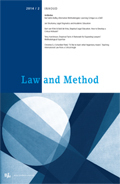|
Both H.L.A. Hart and John Searle repeatedly refer to games in their work on the concept of law and the construction of social reality respectively. We can argue that this is not a coincidence, Hart’s analysis of law as a system of primary and secondary rules bears close resemblances to Searle’s analysis of social reality as a system of regulative and constitutive rules and the comparison to games leads to interesting insights about the ontology of law and legal epistemology. The present article explores both the institutional theory of law that can be devised on the basis of the work of Hart and Searle, the method of analytical philosophy they employ and the particular consequences that can be deduced for legal research from the resulting legal theory. |

| Article |
|
| Authors | Arie-Jan Kwak |
| AbstractAuthor's information |
| Article |
|
| Authors | Geoffrey Samuel |
| AbstractAuthor's information |
|
The purpose of this article is to investigate whether the notion of an interest should be taken more seriously than the notion of a right. It will be argued that it should; and not only because it can be just as amenable to the institutional taxonomical structure often said to be at the basis of rights thinking in law but also because the notion of an interest has a more epistemologically convincing explanatory power with respect to reasoning in law and its relation to social facts. The article equally aims to highlight some of the important existing work on the notion of an interest in law. |
| Article |
|
| Authors | Giacomo Delledonne |
| AbstractAuthor's information |
|
The article discusses the contribution of comparative law to the study of federalism and decentralisation. In doing so, it stresses the relevance of the notion of federalising process, as elaborated by Carl J. Friedrich. |


